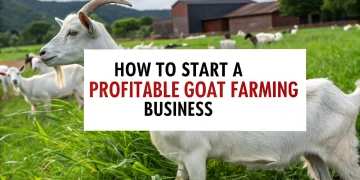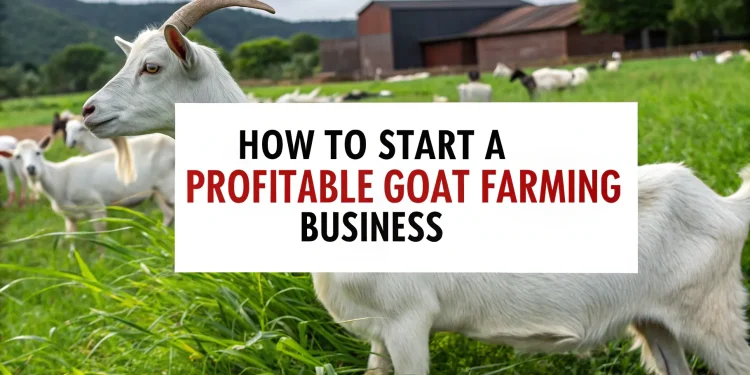Among India’s agribusiness investments, the goat farming business emerges as a unique combination of low risk and high return, and it is easily adaptable to modern farming technologies and traditional farming techniques. It is no longer regarded as a rural, backyard enterprise. Goat farming is progressively becoming a scalable, commercially viable business for first-time entrepreneurs, SMEs, and even established farmers.
The livestock sector is proving to be a profitable business with the growing demand for goat meat, goat milk, manure, and even goat leather. India’s ecological conditions, along with the high domestic demand and availability of export options, make goat farming one of the most profitable options in animal husbandry.
The Shift to Goat Farming By Business Owners
The profitability and flexibility offered by goat farming is enticing entrepreneurs. Goat farming, unlike cattle farming, is cheaper to maintain and operate. There is a lower spatial requirement, and many different agro-climatic zones can be utilized. Most importantly, goats have a quick return on investment and fast reproductive cycles.
Most Indian communities accept goat meat for cultural and religious reasons, making it immune to demand fluctuations. Compared to cow milk, goat milk is less consumed. However, it is gaining attention for its nutritional and medicinal benefits. Moreover, goat manure is a valued byproduct in organic farming and biogas generation.
Through goat farming, people can earn income from meat, milk, manure, breeding, and even hides. This makes goat farming an integrated venture that fosters rural livelihoods, supports sustainability, and offers commercial returns.
Related: List of 150 Profitable Business Ideas for MSME
Market Outlook: Demand, Growth & Opportunity
India ranks second in the world in the population of goats and stands among the highest consumers of goat meat. With increasing demand for protein, urbanization, changing dietary habits, and rising incomes, the livestock industry is set for robust growth in the country by 2030.
Both urban and rural markets are steadily increasing the demand for goat meat, and while it is priced at a premium, it is regarded as lean and healthy. Moreover, the Gulf, Southeast Asia, and certain parts of Africa have strong demand for Indian-origin goat meat due to its taste and the slaughtering practices, as well as availability of halal-certified meat.
Goat milk is becoming more popular in niche urban markets, especially for the lactose-intolerant population and wellness-oriented consumers. The production of cheese, ghee, baby food, and even skin care products is steadily on the rise. Even though goat hide is a secondary product, it is still in demand in the fashion and leather accessory industries.
Veterinary support infrastructure, government self-employment schemes in animal farming, and the availability of MSME loans under Startup India are also aiding in the rapid formalization of the sector.

Building a Goat Farming Business
Building a goat farming business starts with defining the operational model, which is based on the target market, location, availability of feed resources, and business goals.
For a quicker cash flow and wider market access, meat production is ideal. Preferred breeds for high weight gain and meat yield are Boer, Sirohi, and Osmanabadi. For those interested in value-added dairy products, dairy goat farming is a better model with breeds like Jamunapari and Beetal who are high milk producers. Additionally, breeding farms can be established to sell purebred or crossbred kids to other farmers and institutional buyers.
In areas with sufficient land space and integrated farming operations, goat rearing can be coupled with fodder growing, organic manure and biogas unit production, fomenting a self-sustaining circular business.
The market ecosystem you can potentially access should determine your business model, which should a blend of immediate profitability and future growth potential.
Choosing the Right Goat Breed
Choosing the right goat breed is not only critical biologically, but also a business profundity. Breed selection influences growth performance, immunity to sickness, reproduction efficiency, feed meat ratio, and even the quality of the end products. It also determines whether your business operations pivot around meat, milk or breeding stock.
The Boer goat is a meat-focused farm favorite and is popular around the world for its rapid growth and high carcass yield. Equally, Indian breeds like Sirohi and Osmanabadi are resilient, heat-tolerant, and do well in semi-intensive systems.
If you’re looking to start a dairy goat farm, Jamunapari and Beetal are good choices thanks to their high milk production and adaptability. They are also dual-purpose, generating revenue from both milk and meat.
The Black Bengal breed is in demand in Eastern India for their prolific kidding and early maturity. They are popular for backyard farming and to be sold in the local market.
Selecting the right breed from certified farms or government-approved livestock centers guarantees that the animals are disease-free and genetically strong, which is great for the foundation of your enterprise.
Housing, Hygiene and Infrastructure Planning
Compared to larger livestock such as cows and buffaloes, goats do not demand overly complex infrastructure. However, for larger-scale commercial operations, proper housing is critical for maintaining healthy animals, reducing mortality, and improving farm management.
Goat sheds must be dry and elevated and well-ventilated, constructed with easily cleanable materials. A raised floor helps prevent hoof infections and promotes drainage. The roof must be leak-proof, and there must be enough space to prevent crowding, which leads to stress and the spread of disease.
Ideally, zoning for facilities includes breeding, growing, isolation for sick goats, and kidding. Also, the facility should provide adequate lighting and water, and easy access for veterinary visits.
Location is another important aspect. The land must have access to clean water, be close to feed resources, veterinary clinics and the market. If located in a drought-prone area, plan to store or grow green fodder for year-round availability.
Feeding and Nutrition: The Driving Force of Productivity
In goat farming, feed management is critical, since it is the single greatest operational expense, constituting over 50% of the costs. From a business standpoint, proper feeding increases weight gain, milk output, reproduction, and even health.
A goat’s nutritional needs include a balanced diet of green and dry forages, roughage, and even minerals. For commercial goat farming, green fodders are to be supplemented with dry roughages, oil cakes, and grains. Leguminous and napier grasses provide protein, though dry fodders in the form of hay and straw also assist in digestion.
In addition, novel strategies such as aquaculture and hydroponics can be used to enhance nutritional value while lowering costs. Clean water is a requirement at all times, but is especially essential during lactation and dry periods.
Health and productivity can be sustained across the herd with the help of a feeding regimen tailored to age, weight, and intended purpose, be it lactation, breeding, or growth.
Related: How to Start a Poultry Business in India
Healthcare and Disease Management
The goat farming industry is not plagued with risks; however, a proactive approach is critical for disease management. The operational plan should integrate a dedicated veterinary care unit for the herd. To win the fight against averted epidemics such as dewormed, vaccinated and health checked, the herd is bound to be wiped out.
Bringing new animals to the farm requires a quarantine period of 14 to 21 days. It is important to vaccinate for Peste des Petits Ruminants (PPR), Foot and Mouth Disease (FMD), and Enterotoxaemia. Common infections and parasitic issues can be avoided by maintaining hygiene in sheds and feeding equipment, and by rotating grazing areas.
Having a basic first-aid kit and properly trained personnel on the farm greatly aids in improving response times during emergencies. Many farmers now use smartphone apps and RFID tags to organize and log the health of the herd digitally.
Breeding, Reproduction, and Herd Expansion
A doe can reproduce quickly with ease. If properly managed, a herd can double within 18 to 20 months with a doe averaging 1.5 to 2 kids every 8 months. To prevent inbreeding and maintain productivity, mating should be controlled and timed. One healthy buck can service 20 to 25 does. To improve farm genetics and better control breeding cycles, artificial insemination is becoming more common.
Areas for kidding (birthing) should be clean and closely monitored. Vaccination and the administering of colostrum within the first few hours of life is critical for building a kid’s immune system. Over time, extra children can be sold for livestock, meat, or for breeding, depending on your farming objectives.
View our Handbooks on Livestock Farming
Operations and Process Flow in Goat Farming
A typical goat farming operation includes several interlinked stages, from sourcing and breeding to marketing and waste management. Here’s a simplified overview of the process:
- Animal procurement: Select and purchase disease-free, healthy animals.
- Housing and shed setup: Construct climate-suitable infrastructure.
- Feeding and fodder management: Grow or source nutritional feed.
- Breeding and reproduction: Plan breeding cycles and kid rearing.
- Health and vaccinations: Maintain herd health through regular vet checks.
- Growth tracking and weight management: Monitor animals till market weight.
- Sales and marketing: Engage with buyers, meat processors, or dairies.
- Waste utilization: Use goat droppings for compost or biogas production.
Each stage requires attention to detail and process optimization to ensure profitability and sustainability.
For more information, check out this video
Marketing Channels and Sales Strategy
Selling your produce is as important as raising it. Establishing local market linkages early helps ensure regular cash flow. Meat goats are typically sold to local traders, slaughterhouses, or directly to consumers during festival seasons.
In case of dairy production, building a loyal customer base or connecting with niche organic milk brands or cooperatives offers steady income. Goat milk products like ghee, cheese, or soap are also being sold online via direct-to-consumer platforms.
Breeding farms, meanwhile, supply kids or bucks to development programs, NGOs, or government schemes. Positioning your farm as organic, hygienic, or disease-free can help you command premium prices in metros and export markets.
NPCS Support for Goat Farming Entrepreneurs
NIIR Project Consultancy Services (NPCS) plays a vital role in helping entrepreneurs navigate the complexities of launching a goat farming enterprise. NPCS prepares Market Survey cum Detailed Techno-Economic Feasibility Reports tailored to livestock and agro-industrial projects.
Their reports include vital insights into the manufacturing process, raw materials, plant layout planning, and project financials. NPCS enables entrepreneurs to assess the technical feasibility, market potential, and operational scale before setting up a commercial goat farm or allied enterprise.
Find Best Idea for Yourself With our Startup Selector Tool
Conclusion: Is Goat Farming Your Next Industrial Opportunity?
Goat farming is no longer a subsistence occupation. With growing protein demand, changing food habits, and government support, it has become a viable and scalable agribusiness model. For startups and rural entrepreneurs seeking a self-sustaining, multi-income stream venture, goat farming offers one of the most balanced risk-to-return profiles.
By applying scientific management, strategic planning, and expert support, you can turn a simple livestock business into a profitable industrial-scale enterprise. With robust demand, modern veterinary practices, and access to market intelligence, goat farming today is more opportunity than challenge.
Need professional guidance or a detailed project report for your goat farming venture?
Reach out to NIIR Project Consultancy Services (NPCS) to begin your entrepreneurial journey with expert insights, feasibility analysis, and end-to-end project planning.


















